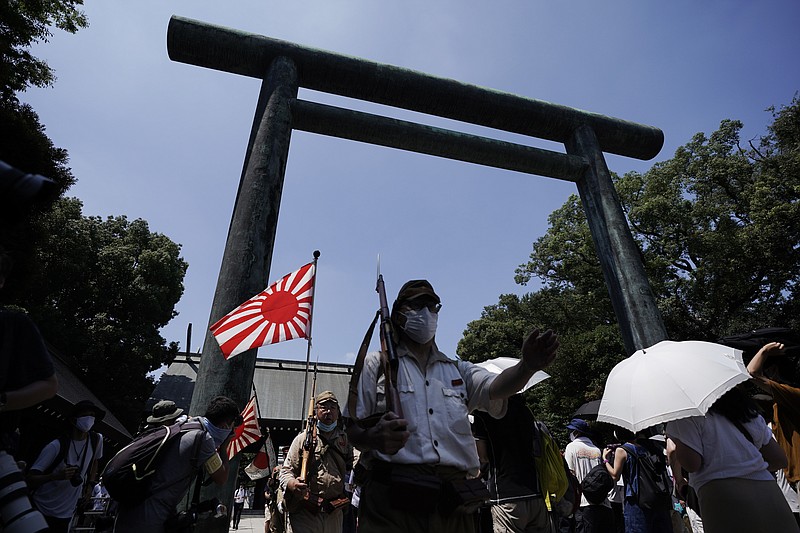TOKYO -- Japan on Saturday marked the 75th anniversary of its surrender in World War II, with Emperor Naruhito expressing "deep remorse" over his country's wartime actions, at a somber annual ceremony curtailed by the coronavirus pandemic.
[Video not showing up above? Click here to watch » https://www.youtube.com/watch?v=MiLLhQ870mw]
Naruhito pledged to reflect on the war's events and expressed hope that the tragedy would never be repeated. There was no word of apology from Prime Minister Shinzo Abe, who gave thanks for the sacrifices of the Japanese war dead but had nothing to say about the suffering of Japan's neighbors.
"Reflecting on our past and bearing in mind the feelings of deep remorse, I earnestly hope that the ravages of war will never be repeated," Naruhito said in a short speech at the event in Tokyo marking the 75th anniversary of Japan's surrender on Aug. 15, 1945.
Meanwhile, South Korean President Moon Jae-in on Saturday offered talks with Japan to resolve a bitter feud over wartime grievances as that nation also celebrated the 75th anniversary of its liberation from Japanese colonial rule at the end of World War II.
In a nationally televised speech, Moon said that his government has "left the door of consultations wide open" for Japan to settle a long legal and diplomatic dispute over compensation for Koreans who had been subjected to forced labor at mines, factories and other sites.
About 500 participants in Japan, reduced from 6,200 last year by virus fears and worries about the fading memories of the fast-aging war generation, mourned the dead with a minute of silence. Masks were required, and there was no singing of the "Kimigayo" national anthem.
Naruhito has promised to follow in the footsteps of his father, who devoted his 30-year career to making amends for a war fought in the name of Hirohito, the current emperor's grandfather.
Abe has increasingly sought to whitewash Japan's brutal past since taking office in December 2012. He hasn't acknowledged Japan's wartime hostilities during Aug. 15 speeches, which had previously been a nearly 20-year tradition that began with the 1995 apology of Socialist leader Tomiichi Murayama.
Abe, in a largely domestic-focused speech, said the peace that Japan enjoys today is built on the sacrifices of those who died in the war. He pledged that Japan will reflect on lessons from history and will not repeat the war devastation. He listed damage inflicted on Japan and its people, including the U.S. atomic bombings of Hiroshima and Nagasaki, firebombings of Tokyo and the fierce battle of Okinawa.
Abe pledged to play a greater role in tackling global problems. Under his goal of turning Japan into a "beautiful" and "normal" nation, Abe has steadily pushed to cleanse Japan of its embarrassing wartime history and build up its military by stretching the interpretation of Japan's war-renouncing constitution. It includes acquiring greater missile-defense capability in the face of a growing military threat from North Korea and China.
"Remembering those days, I strongly feel we should never wage war," said Shoji Nagaya, 93, who traveled from Hokkaido in northern Japan to commemorate his brother who died of illness while serving in China. "But politicians today seem to have different views than ours, and I really hope that they will not head to a wrong direction."
Abe stayed away from the shrine that honors convicted war criminals among the war dead. He sent a religious offering through a lawmaker, a gesture meant to avoid angering China and South Korea, which consider the Yasukuni shrine a symbol of Japan's militarism. Abe last visited Yasukuni in December 2013.
In South Korea, Moon avoided direct criticism of the conservative Japanese government of Abe, which has insisted that all compensation issues were settled when the two countries normalized relations under a 1965 treaty.
[Gallery not loading above? Click here for more photos » arkansasonline.com/816japan/]
Japan's stance was rebutted by South Korea's Supreme Court in 2018, when it ruled that the deal did not cover individual rights to seek reparations and called on Japanese companies to compensate aging Korean plaintiffs who had been forced into slave labor.
"Our government is ready to sit face to face with the Japanese government at any time" to find a mutual solution the victims can support, Moon said. He said the process would help build a "bridge of friendship and future cooperation" between the countries.
Tokyo didn't immediately respond to Moon's comments.
North Korea's official Korean Central News Agency in a statement urged Japan to make a "sincere apology and reparation" to Korean victims of forced labor and military sexual slavery.
Information for this article was contributed by Emily Wang, Chisato Tanaka and Yu Bing of The Associated Press.









